The Love for Three Oranges, Grange Park Opera
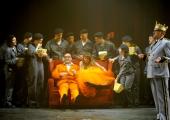

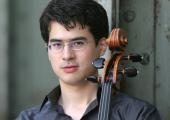
For many of us, this was bound to be an emotional evening. Noëlle Mann, doyenne of all things Prokofievian on the editorial, archival, teaching and performing fronts, died peacefully at home last Friday, and it was to her that Vladimir Jurowski dedicated a typically bold programme of Prokofiev's late epic for cello and orchestra, the Symphony-Concerto, and a big but rather less focused symphony by his closest composer-friend Nikolay Myaskovsky. Perhaps it's presumptuous to speak for the departed; but I could hear Noëlle responding vitally to her master's voice, applauding Jurowski for championing the lesser-known figure but sternly proclaiming the verdict shared by most of us: that while Prokofiev was touched by the divine spirit, poor, diligent Myaskovsky clearly wasn't.

It's still not clear whether his clever, brilliantly orchestrated compositions are here to stay (though they're certainly having a good run at the moment). As a conductor, he's not yet nimble on his feet. Yet after yesterday evening's colossal recital, I doubt if anyone would deny that Thomas Adès is a pianist of the first order, a dramatic master of keyboard colour who pulls you into his edgy but often very beautiful sound world and sometimes casts you adrift from your critical moorings.
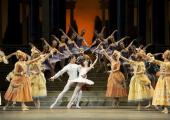
No longer, it seems, need ballet's most transformable heroine languish by the seasonal fireside. It's true that you'll have to wait until Christmas to see the most visually striking Cinderella of all again - Ashley Page's fitfully ingenious Scottish Ballet version showcasing magical designs by Antony McDonald. But English National Ballet's Cinders is out and about this spring, and now Ashton's first full-length triumph returns with period glitter to Covent Garden.

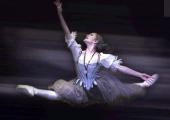
Was it with a hollow laugh that ENB programmed Cinderella for the election period - as a reminder that glittery fairy phaetons are in fact pumpkins with money? Was it a hint that ballet needs political fairy godmothers? With airwaves full of budget cuts, nothing was more welcome yesterday than to go into a Bristol Hippodrome matinee, full of noisy children, and watch this delightful fairytale of wish-fulfilment laid before them. Even better, with the radiant Elena Glurdjidze as the ash girl.

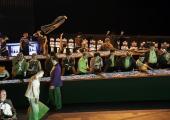
Fasten your seatbelts; it's a bumpy ride to the casino. In Prokofiev's wilful but uncompromising take on Dostoyevsky's tale of obsession, all the private paths of love, lust and greed lead to the gambling tables - eventually. The composer saves up one of the most adrenalin-charged scenes in 20th-century opera for the last act, giving director and conductor some headaches in generating interest and comprehensibility along the way. With a dedication we can only imagine, Richard Jones and Antonio Pappano have solved Prokofiev the chess master's conundrum better than in any previous production I've seen.
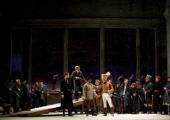
Two hundred costumes, over 60 solo roles and the world premiere of a great operatic composer's first thoughts: it's a task which would daunt the best-resourced opera company in the world.
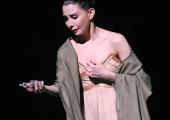
There are times when critics sheathe their quill tips, others when they don’t. Rupert Pennefather, the tall blond Englishman who has been earnestly promoted by the Royal Ballet as hard as they can to be the next Jonathan Cope, has attracted some devastating notices, and last night’s emergency outing as Romeo isn’t going to fatten his cuttings file.